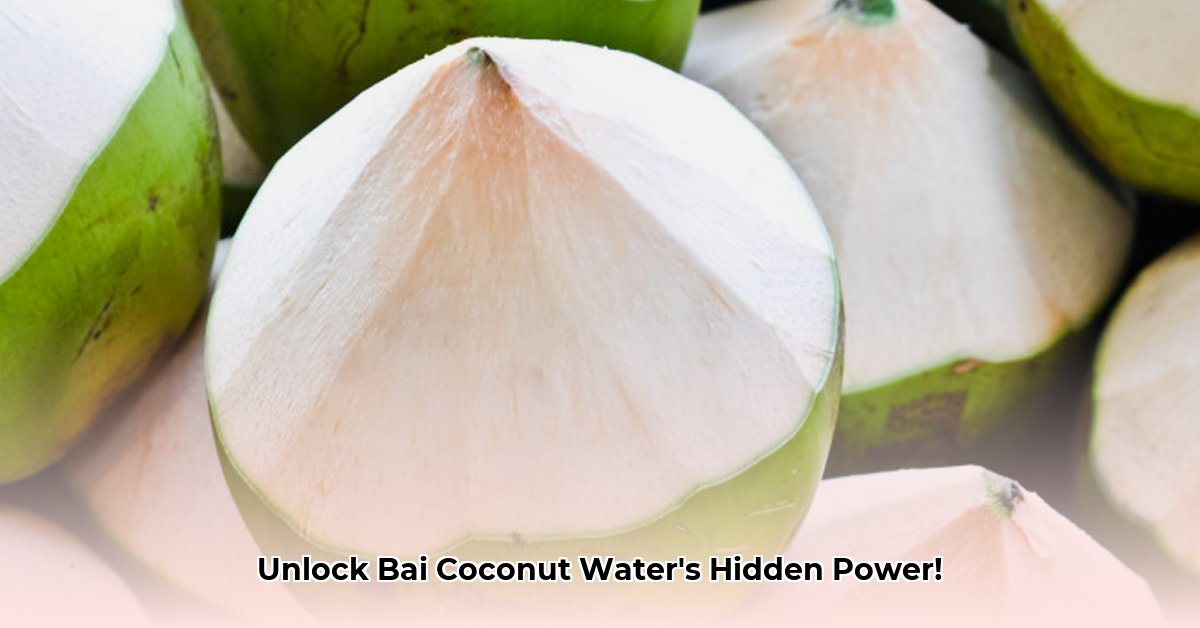
Bai coconut water has surged in popularity, promising a healthy hydration option. But a closer look reveals a more complex nutritional profile than its marketing suggests. This review will dissect Bai's ingredients, analyze its health claims, and compare it to competitors, helping you decide if it aligns with your health goals.
Decoding Bai's Ingredient List: A Critical Analysis
Bai's ingredient list, while seemingly straightforward, warrants careful scrutiny. Let's break down the key components and assess their potential impact.
Erythritol: This sugar alcohol provides sweetness with minimal calories. However, studies suggest that erythritol can cause digestive distress (bloating, gas, diarrhea) in some individuals. Emerging research even hints at potential links to cardiovascular issues, although further investigation is needed to confirm these findings. Dr. Anya Sharma, a registered dietitian at the University of California, San Francisco, cautions, "While erythritol offers a low-calorie alternative, its potential side effects shouldn't be dismissed. Individual tolerance varies significantly."
Citric Acid: Used as a preservative and for its tart flavor, citric acid can irritate sensitive stomachs, potentially causing inflammation or heartburn.
Natural Flavors: This ambiguous term lacks transparency, making it difficult to assess the long-term effects of these unspecified additives. The lack of precise information is a significant drawback.
Plastic Packaging: Bai's plastic bottles raise environmental concerns. While research on microplastic leaching into beverages is ongoing, potential risks remain.
Caffeine (in select varieties): Some Bai drinks contain caffeine, a stimulant that can affect individuals differently. Those sensitive to caffeine should adjust their intake accordingly.
Bai's Health Claims: A Reality Check
Bai often positions itself as a healthier alternative to sugary drinks, highlighting antioxidants from fruit juices. While fruit juices contain beneficial compounds, the overall nutritional value must be considered in context. The potential negative effects of erythritol and citric acid may outweigh the relatively modest antioxidant benefits for some individuals. Is a small antioxidant boost worth risking digestive upset or inflammation? This is a crucial question to ask yourself.
Bai vs. The Competition: A Comparative Analysis
Numerous coconut water brands and low-calorie beverages compete with Bai. Many offer simpler ingredient lists, foregoing erythritol and other additives. Others may contain added sugars, but transparency in labeling is often better. Comparing labels carefully—looking for recognizable and easily understood ingredients—will help you make an informed choice. A preference for transparency and clean labels will guide you towards brands with more straightforward compositions.
Making Informed Choices: Recommendations for Consumers
The decision of whether or not to consume Bai coconut water is personal. Moderation is key. If you are sensitive to sugar alcohols or citric acid, it's best to avoid Bai entirely. If you enjoy the taste and wish to consume it, limiting your intake will minimize exposure to potential negative impacts. Remember to:
- Read labels meticulously: Understand all ingredients and their quantities.
- Assess personal sensitivities: If you are sensitive to caffeine or sugar alcohols, adjust or forgo consumption.
- Practice moderation: Do not rely on Bai as your sole hydration source.
- Consult a healthcare professional: Individuals with specific health conditions should discuss Bai consumption with their doctor.
Conclusion: Prioritizing Transparency and Informed Consumption
Bai coconut water offers a low-calorie, low-sugar alternative to sugary drinks. However, the presence of erythritol, citric acid, and unspecified natural flavors raises concerns regarding potential long-term health effects and environmental impact. Ultimately, informed consumption requires careful label reading, consideration of individual sensitivities, and the pursuit of balanced choices within a wider healthy lifestyle.